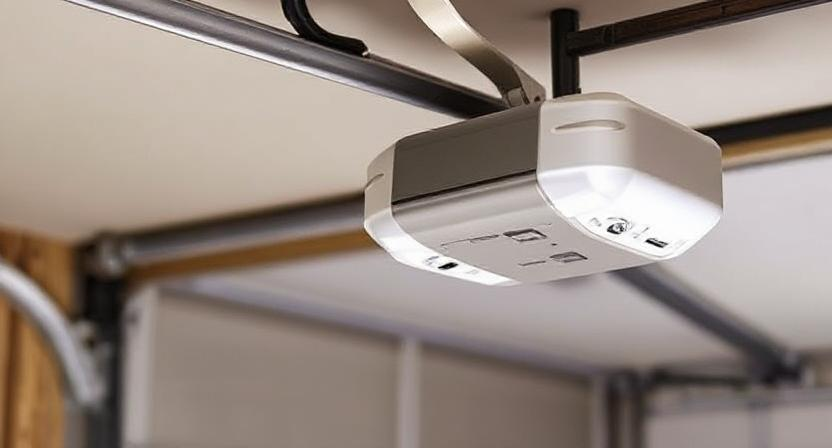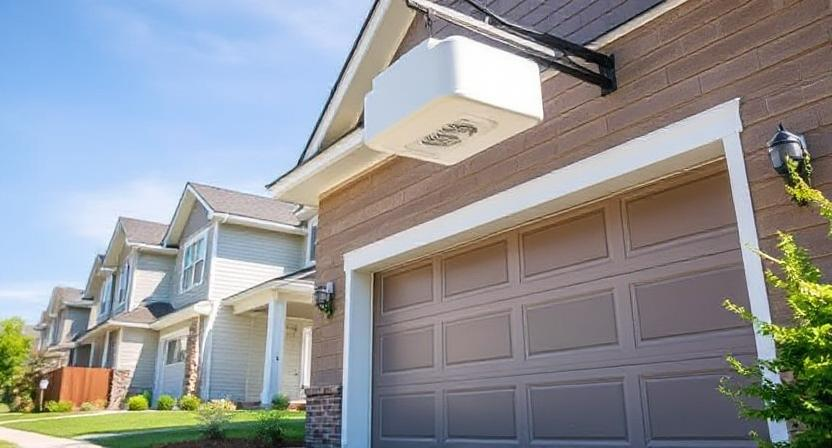If you’re asking “how big of a garage door opener do i need?”, you’ve come to the right place. This is one of the most important questions homeowners face when replacing or installing a garage door opener. The answer isn’t about physical size—it’s about matching the opener’s power to your specific garage door’s weight and size.
Table of Contents
ToggleChoosing the wrong size opener can lead to premature wear, noisy operation, and complete motor failure. The right choice, however, will provide years of smooth, reliable service. This comprehensive guide will walk you through everything you need to know to determine exactly how big of a garage door opener do i need for your situation.
We’ll cover horsepower ratings, door weight calculations, and all the factors that influence your decision. By the end, you’ll be able to confidently choose the perfect opener for your home.
Understanding Garage Door Opener Horsepower
When wondering “how big of a garage door opener do i need?”, you’re really asking about horsepower (HP). Horsepower measures the motor’s strength and its ability to lift heavy loads consistently.
The Three Main Residential Horsepower Ratings:
-
½ Horsepower: Basic option for lighter doors
-
¾ Horsepower: Standard choice for most homes
-
1 Horsepower and Above: Heavy-duty solutions for large doors
Think of horsepower like engine power in a car. You need adequate power to handle the load without straining the system.
Step 1: Determine Your Garage Door’s Weight
The most critical step in determining “how big of a garage door opener do i need” is knowing your door’s exact weight. Guessing can lead to expensive mistakes.
How to Safely Weigh Your Garage Door:
-
Disconnect the opener: Pull the red emergency release cord
-
Lift the door manually: Raise the door completely by hand
-
Use a bathroom scale: Place a scale on a step ladder under one corner
-
Lower door onto scale: Gently rest one corner on the scale
-
Calculate total weight: Multiply the scale reading by 2
This gives you the approximate total weight of your garage door.
Matching Door Weight to Opener Horsepower
Now that you know your door’s weight, use this chart to determine “how big of a garage door opener do i need“.
½ HP Garage Door Openers
-
Best for: Lightweight single-car doors
-
Weight capacity: Up to 150 pounds
-
Ideal for: Non-insulated steel, aluminum, or fiberglass doors
-
Typical doors: Single 8’x7′ or 9’x7′ doors
¾ HP Garage Door Openers
-
Best for: Most modern homes and standard doors
-
Weight capacity: 150-350 pounds
-
Ideal for: Insulated steel doors, double-car doors, wood doors
-
Typical doors: Standard 16’x7′ insulated doors
1 HP+ Garage Door Openers
-
Best for: Heavy custom and oversized doors
-
Weight capacity: 350+ pounds
-
Ideal for: Solid wood doors, carriage-style doors, large openings
-
Typical doors: Custom 18’x8′ wood doors or larger
Additional Factors That Affect Opener Size
Beyond raw weight, several other factors influence “how big of a garage door opener do i need“.
Door Material and Insulation:
-
Insulated doors are significantly heavier than non-insulated
-
Wood doors are heavier than steel doors
-
Glass elements add additional weight
Climate and Weather Conditions:
-
Cold weather makes doors operate harder
-
Humidity can affect door movement
-
Extreme temperatures require more powerful openers
Frequency of Use:
-
High-use situations benefit from more powerful openers
-
Occasional use may allow for smaller models
Safety and Security Features:
-
Modern safety features may require more power
-
Security enhancements can affect performance
The Consequences of Choosing Wrong Size
Understanding what happens when you choose incorrectly is crucial when determining “how big of a garage door opener do i need“.
Too Small (Underpowered):
-
Motor strain and overheating
-
Premature motor failure
-
Incomplete opening/closing cycles
-
Excessive noise during operation
-
Shortened lifespan
Too Large (Overpowered):
-
Unnecessary expense
-
Potential for door damage
-
Higher energy consumption
-
Possible voiding of warranties
Drive Type Considerations
The type of drive system also affects “how big of a garage door opener do i need“.
Chain Drive Openers:
-
Most affordable option
-
Noisiest operation
-
Require regular maintenance
-
Good for detached garages
Belt Drive Openers:
-
Quietest operation
-
Smoother performance
-
Higher cost
-
Ideal for attached garages
Screw Drive Openers:
-
Moderate noise level
-
Fewer moving parts
-
Good for consistent climates
-
Mid-range pricing
Professional Measurement Services
If you’re still unsure about “how big of a garage door opener do i need“, consider professional help.
Benefits of Professional Assessment:
-
Accurate weight measurements
-
Proper door balance evaluation
-
Expert recommendations
-
Installation included
-
Warranty protection
When to Call a Professional:
-
If your door is unusually heavy
-
When dealing with custom doors
-
If the door isn’t balanced properly
-
When safety is a concern
Installation Considerations
Proper installation affects how well your opener performs, regardless of size.
DIY Installation:
-
Possible for standard setups
-
Requires technical skill
-
Time-consuming
-
Potential safety risks
Professional Installation:
-
Ensures proper setup
-
Includes safety checks
-
Often includes warranty
-
Saves time and hassle
Regular maintenance helps your opener perform well regardless of size.
Monthly Maintenance Tasks:
-
Test auto-reverse feature
-
Check sensor alignment
-
Listen for unusual noises
-
Visual inspection of components
Annual Maintenance Tasks:
-
Lubricate moving parts
-
Tighten hardware
-
Professional inspection
-
Safety system testing
Cost Considerations
Understanding costs is part of determining “how big of a garage door opener do i need“.
Price Ranges by Horsepower:
-
½ HP models: $150-$250
-
¾ HP models: $200-$350
-
1 HP+ models: $300-$600+
Additional Cost Factors:
-
Drive type (belt drive costs more)
-
Smart features increase price
-
Professional installation adds cost
-
Warranty length affects price
Making Your Final Decision
When determining “how big of a garage door opener do i need“, follow this process:
-
Weigh your door accurately
-
Consider door material and insulation
-
Evaluate usage patterns and frequency
-
Choose appropriate horsepower based on weight
-
Select drive type for noise preferences
-
Consider professional installation for best results
Frequently Asked Questions
What if my door is between weight categories?
Always choose the next larger size. It’s better to have slightly more power than not enough.
Can I use a larger opener than recommended?
Yes, but it’s usually unnecessary and more expensive. Stick with the appropriate size for your door.
How important is door balance?
Extremely important. An unbalanced door will strain even the most powerful opener.
Do smart features affect size requirements?
No, but they may require additional electrical considerations.
Conclusion: Choosing the Right Size with Confidence
Determining “how big of a garage door opener do i need” doesn’t have to be confusing. By understanding your door’s weight, considering additional factors, and following the guidelines in this article, you can make an informed decision that will provide years of reliable service.
Remember that when in doubt, it’s usually better to choose a slightly more powerful opener than you think you need. The small additional investment will provide better performance, longer lifespan, and greater satisfaction with your garage door system.
If you’re still uncertain, consult with a garage door professional who can provide personalized recommendations based on your specific situation. The right choice will ensure smooth, reliable operation for years to come.

hello friends
my name is Sumit kumar. I am the owner of this website and I share only garage door and lift master information and only informational posts on my website. And I have written this post myself and have given you only a good guide and information.


